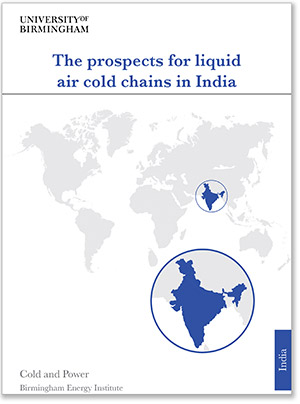India could save £4.4bn in food waste
17th December 2014 UK: The establishment of a sustainable cold chain in India could save £4.4bn worth of fruit and vegetables wasted annually.
UK: The establishment of a sustainable cold chain in India could save £4.4bn worth of fruit and vegetables wasted annually.
Experts at the University of Birmingham (UK) maintain that a sustainable cold chain of refrigerated warehousing and transport could also benefit India’s position as the world’s third largest pharmaceutical producer. Currently, it is estimated almost 20% of temperature sensitive healthcare products arrive damaged or degraded because of a broken cold chain, including 25% of vaccines.
India’s current cold chain capacity is tiny compared to potential demand. Less than 4% of the country’s fresh produce is transported by cold chain, compared to over 90% in the UK. However, India is expected to invest almost £9.6m in the sector in the next five years, with new analysis for the University of Birmingham study suggesting the Indian refrigerated vehicle fleet may need to grow almost 100 fold by 2025.
 The new study – The prospects for liquid air cold chains in India – Birmingham academics are emphasising that conventional cold chain technologies could have serious environmental consequences, and more sustainable approaches are needed. For example, the diesel-powered transport refrigeration unit, the workhorse of the global cold chain, consumes up to 20% of the truck’s fuel, but also emits 29 times as much particulate matter and six times as much nitrogen oxide as a modern propulsion engine.
The new study – The prospects for liquid air cold chains in India – Birmingham academics are emphasising that conventional cold chain technologies could have serious environmental consequences, and more sustainable approaches are needed. For example, the diesel-powered transport refrigeration unit, the workhorse of the global cold chain, consumes up to 20% of the truck’s fuel, but also emits 29 times as much particulate matter and six times as much nitrogen oxide as a modern propulsion engine.
One solution to this problem is to use the vast amounts of cold lost to the environment, especially during the re-gasification of liquefied natural gas. LNG is natural gas ‘packaged’ in cold, which is then thrown away when the gas is ‘unpacked’. This cold can be recycled to produce cheap, low-carbon liquid air and provide zero-emission cooling and power in a wide range of static and mobile applications. Furthermore, liquid air can also be produced from ‘wrong time’ renewable energy, such as surplus wind power produced at night when demand is low.
Liquid nitrogen, which can be used in the same way as liquid air, is already widely available in India and the industry has 3,500 tonnes per day of spare production capacity. This would be enough, in principle, to cool some 17,000 refrigerated vehicles, twice the size of India’s current refrigerated truck fleet, and equal to the estimated immediate unmet demand.
Furthermore, the development of sustainable liquid air cold chains in India would require significant numbers of engineers to operate, maintain and eventually manufacture the necessary equipment. This would therefore align with the Government’s aims for job and skills growth.
The University of Birmingham is developing radically new technological solutions for cold storage and utilisation. The work includes novel cold storage materials and manufacture technologies that are easier to use, more cost effective and deliver a better performance. Much of this work is undertaken by the Birmingham Energy Institute (BEI) at the University, which is a focal point for the institution and its national and international partners to tackle challenges for meeting future demands to provide cold and power in both an environmentally and economically sustainable way.
In 2015, the BEI will lead a Commission on Cold to investigate solutions to deliver sustainable cooling and power.
Related news:
Hubbard trials liquid-air-powered refrigeration – June 5, 2014
UK: Suffolk-based Hubbard Products is collaborating on field trials of a new liquid-air-powered transport refrigeration system. Read more…
IMechE: refrigeration must feed the world – June 30, 2014
UK: The Institution of Mechanical Engineers has called for urgent action to roll out a sustainable cold chain in the developing world. Read more…
Refrigeration the key to world food supply – November 21, 2014
UK: The importance of refrigeration in efforts to prevent food waste and create a robust global food chain was highlighted at a world-first summit in London yesterday. Read more…







